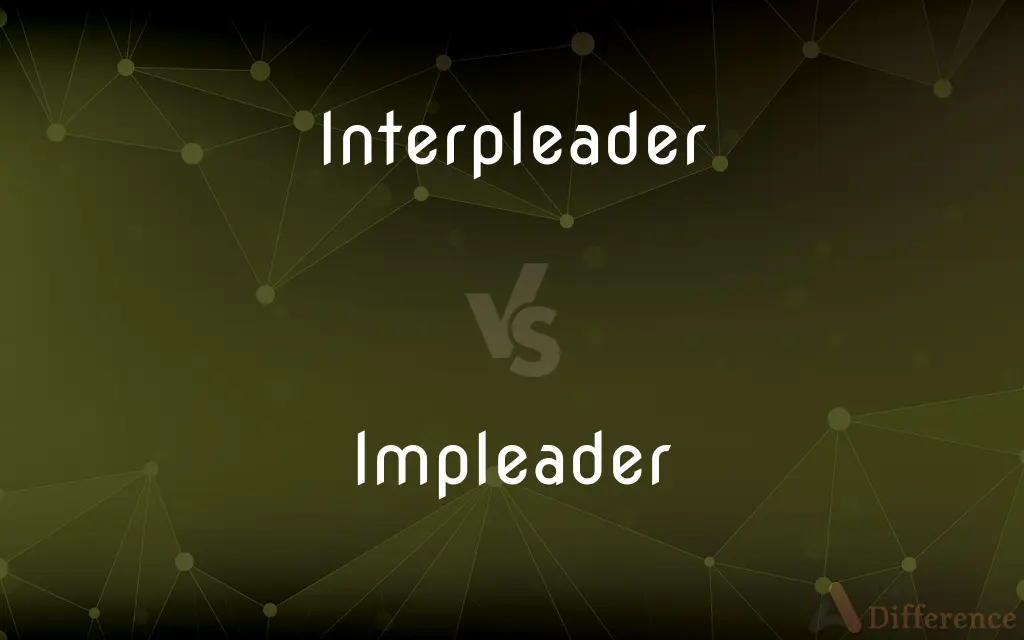Interpleader vs. Impleader — What's the Difference?
Edited by Tayyaba Rehman — By Urooj Arif — Updated on February 24, 2024
Interpleader involves multiple claims against the same asset or property, requiring a neutral stance from the holder, while impleader is a procedural tool allowing a defendant to bring a third party into a lawsuit, claiming they are liable.

Difference Between Interpleader and Impleader
Table of Contents
ADVERTISEMENT
Key Differences
Interpleader is a legal mechanism designed to resolve disputes when multiple parties claim entitlement to the same property or money. Impleader, on the other hand, is used in civil litigation when a defendant believes a third party is responsible for all or part of the damages claimed by the plaintiff. By impleading the third party, the defendant seeks to shift liability, making it a strategy for defense.
Interpleader enables the holder of the property, who claims no interest in it, to ask the court to decide ownership, thus protecting themselves from multiple liabilities. Interpleader actions remove the stakeholder from the dispute, letting the claimants argue their entitlement, impleader adds a new party to the existing lawsuit, potentially complicating the case but also spreading liability.
Interpleader requires the stakeholder to deposit the disputed asset with the court, effectively stepping out of the litigation, whereas impleader integrates the third party into the ongoing lawsuit, requiring them to defend their role or liability.
The primary goal of interpleader is to protect the stakeholder from multiple liabilities and lawsuits over the same asset, whereas impleader aims to redistribute the liability from the defendant to another party, possibly reducing the defendant's exposure.
Comparison Chart
Purpose
To resolve multiple claims over the same asset or property.
To bring a third party into a lawsuit for liability.
ADVERTISEMENT
Role of Initiator
Stakeholder with no claim to the asset.
Defendant seeking to shift or share liability.
Legal Strategy
Defensive, to avoid multiple liabilities.
Defensive, to spread or shift liability.
Outcome
Removes stakeholder from dispute, court decides ownership.
Adds a third party to the case, who may share liability.
Application
Used when multiple parties claim the same asset.
Used when a defendant claims a third party is liable.
Compare with Definitions
Interpleader
A legal procedure to determine the rightful claimant to an asset.
The bank filed an interpleader action to resolve the dispute over the deceased's account.
Impleader
A strategy for spreading risk and liability.
Impleader allowed the defendant to seek contribution from a third party.
Interpleader
Used when multiple parties claim the same property.
Facing claims from two heirs, the trustee initiated an interpleader.
Impleader
A procedural tool to involve a third party in a lawsuit.
The contractor impleaded the supplier for providing defective materials.
Interpleader
Protects the stakeholder from multiple liabilities.
The insurance company opted for interpleader to avoid dual payouts.
Impleader
Requires the third party to defend their liability.
The impleaded party contested their responsibility for the damages.
Interpleader
Focuses on resolving ownership disputes.
The interpleader suit determined the rightful beneficiary of the estate.
Impleader
(legal) A procedural device before trial in which a party joins a third party into a lawsuit because that party is liable to an original defendant.
Interpleader
Requires depositing the asset with the court.
The court held the disputed funds in escrow following an interpleader filing.
Impleader
The procedure by which a third party is impleaded.
Interpleader
Interpleader is a civil procedure device that allows a plaintiff or a defendant to initiate a lawsuit in order to compel two or more other parties to litigate a dispute. An interpleader action originates when the plaintiff holds property on behalf of another, but does not know to whom the property should be transferred.
Impleader
Used by defendants to shift liability.
To avoid full liability, the store impleaded the manufacturer in the injury lawsuit.
Interpleader
(legal) Motion for a third party to enter into a lawsuit in process because a matter is being adjudicated in which they have an interest.
Impleader
Adds complexity to the legal process.
Impleader proceedings delayed the original trial date.
Impleader
Impleader is a procedural device before trial in which one party joins a third party into a lawsuit because that third party is liable to an original defendant. Using the vocabulary of the Federal Rules of Civil Procedure, the defendant seeks to become a third-party plaintiff by filing a third party complaint against a third party not presently party to the lawsuit, who thereby becomes a third-party defendant.
Common Curiosities
What is interpleader?
Interpleader is a legal action used to resolve disputes when multiple parties claim rights to the same property or asset, involving a neutral stakeholder.
Why would a defendant use impleader?
To shift or share the liability with a third party believed to be responsible for the plaintiff's damages.
Is impleader a common legal strategy?
Yes, it is commonly used in civil litigation as a defense strategy to involve third parties believed to be responsible for the claim.
How does interpleader protect a stakeholder?
By allowing the stakeholder to deposit the disputed asset with the court, effectively removing themselves from the lawsuit and avoiding multiple liabilities.
Can interpleader and impleader be used in the same lawsuit?
Yes, though they serve different purposes, both can be used in a lawsuit if the circumstances warrant each action.
What is impleader?
Impleader is a procedural tactic in litigation where a defendant brings in a third party, claiming they are liable for all or part of the plaintiff's claim.
Do all jurisdictions allow interpleader and impleader?
Yes, but the rules and procedures for each may vary by jurisdiction.
Who can initiate an interpleader?
Any stakeholder holding an asset claimed by multiple parties, with no personal claim to the asset, can initiate an interpleader.
Can a stakeholder refuse to use interpleader?
Yes, but this refusal could expose them to multiple lawsuits and liabilities over the same asset.
What happens if the impleaded party is found liable?
They may be required to pay all or part of the damages awarded to the plaintiff, reducing the defendant's liability.
Who can be impleaded into a lawsuit?
A third party who is not originally part of the lawsuit but is alleged to be liable for the plaintiff's damages can be impleaded.
What happens to the disputed asset in an interpleader?
It is deposited with the court until the rightful claimant is determined through legal proceedings.
What is the primary benefit of interpleader for stakeholders?
It protects stakeholders from the risk of multiple liabilities and ensures the asset is directed to the rightful claimant.
Are there limitations on using impleader?
Yes, procedural rules and timelines for impleading a third party vary and must be adhered to, otherwise the court may deny the impleader motion.
How does impleader affect the original lawsuit?
It can complicate and prolong the lawsuit by adding more parties and issues into the mix.
Share Your Discovery

Previous Comparison
Zonkey vs. Zeedonk
Next Comparison
Hence vs. SinceAuthor Spotlight
Written by
Urooj ArifUrooj is a skilled content writer at Ask Difference, known for her exceptional ability to simplify complex topics into engaging and informative content. With a passion for research and a flair for clear, concise writing, she consistently delivers articles that resonate with our diverse audience.
Edited by
Tayyaba RehmanTayyaba Rehman is a distinguished writer, currently serving as a primary contributor to askdifference.com. As a researcher in semantics and etymology, Tayyaba's passion for the complexity of languages and their distinctions has found a perfect home on the platform. Tayyaba delves into the intricacies of language, distinguishing between commonly confused words and phrases, thereby providing clarity for readers worldwide.















































